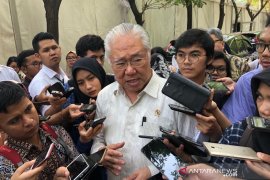The market traders are obligated to sell Bulog`s rice."Jakarta (ANTARA News) - The Indonesian government has responded to the continuous rise in the price of medium-grade rice by announcing the import of 500 thousand tons of rice from Vietnam and Thailand by the end of January this year.
According to the Central Statistics Agency (BPS), the average price of medium-grade rice at the mills in December 2017 rose by 2.26 percent at Rp9,526 per kilogram compared to November, due to an increase in demand.
The average increase in rice prices was not limited to medium-grade rice; premium-grade rice also saw an increase of 3.37 percent at Rp9,860 per kilogram in the same period, according to the BPS.
The Center for Indonesian Policy Studies (CIPS) called upon the government to review the option of imports to curb the increase in prices of medium-grade rice, considering it was becoming a burden for the people, especially the poor.
Head of Research at CIPS Hizkia Respatiadi noted that consistently high rice prices would burden the consumers, especially the poor who earn Rp300,000 or less per month.
The application of the highest retail price (HET) is a short-term solution that will not create long-term stability, according to the research head. Currently, many rice mills are closed because the prices of paddy grain are higher than the HET.
Taking all this into considerations, CIPS has been urging the government to open imports to stabilize the supply and prices of rice.
After a meeting with retailers and retail trade associations at the Trade Ministry on Thursday (Jan 11), Trade Minister Enggartiasto Lukita stated that the government had decided to import rice from various countries, particularly Vietnam and Thailand, where rice prices are cheaper than Indonesia.
Imports will be undertaken by the state trading firm PT Perusahaan Perdagangan Indonesia (PT PPI) and partners to enable the government to exercise control, but the state budget will not be utilized for the purpose.
The imported rice will enter Indonesian markets by the end of January, so it will be sufficient to meet demand until harvest season in February and March.
The monitoring of the Trade Ministry has somewhat stabilized the price of medium-grade rice, but still, the prices are not stable in accordance with the HET.
The type of rice to be imported from Vietnam and Thailand is called "special rice" and not premium, Lukita asserted, because it is not grown in the country.
As regulated in Ministerial Regulation No.1/2018 on the Export and Import of Rice, the imported special rice will be sold at the price of medium-grade rice.
The PT PPI has been assigned to manage the distribution and control the price of the imported rice based on the HET of medium-grade rice at Rp9,450 per kilogram.
The most important thing at the moment is to meet the needs of the people.
The government also urged suppliers, distributors and traders to avoid hoarding rice.
Based on Trade Ministerial Regulation No. 20 of 2017 on Registration of Business Entities for Distribution of Basic Goods, distributors and traders must inform the government about their business, ownership of warehouses, and stocks of goods.
The government has confirmed that any party not reporting their rice stocks will be prosecuted under the law. The Trade Ministry has conducted massive market operations to tackle the price rise. These operations include conducting checks and monitoring by mobilizing 150 staff members of the regional division and sub-division of the State Logistics Agency (Bulog), involved in the distribution of medium-grade rice.
The government has also supplied rice stocks to certain areas, especially the 2.5 thousand traditional markets with the sharpest increase in rice prices, Lukita added.
"The market traders are obligated to sell Bulog`s rice. If a rice trader in the market does not want to sell his stock, then it implies that he only intends to earn profits by manipulating the prices," he pointed out.
According to Lukita, following the sharp rise in rice prices, traders might also be tempted to take advantage of the situation.
To that end, the government plans to resolve the shortage by importing rice from friendly countries.
(Uu.Y013/INE/KR-BSR/B003)
Reporter: Administrator
Editor: Priyambodo RH
Copyright © ANTARA 2018











